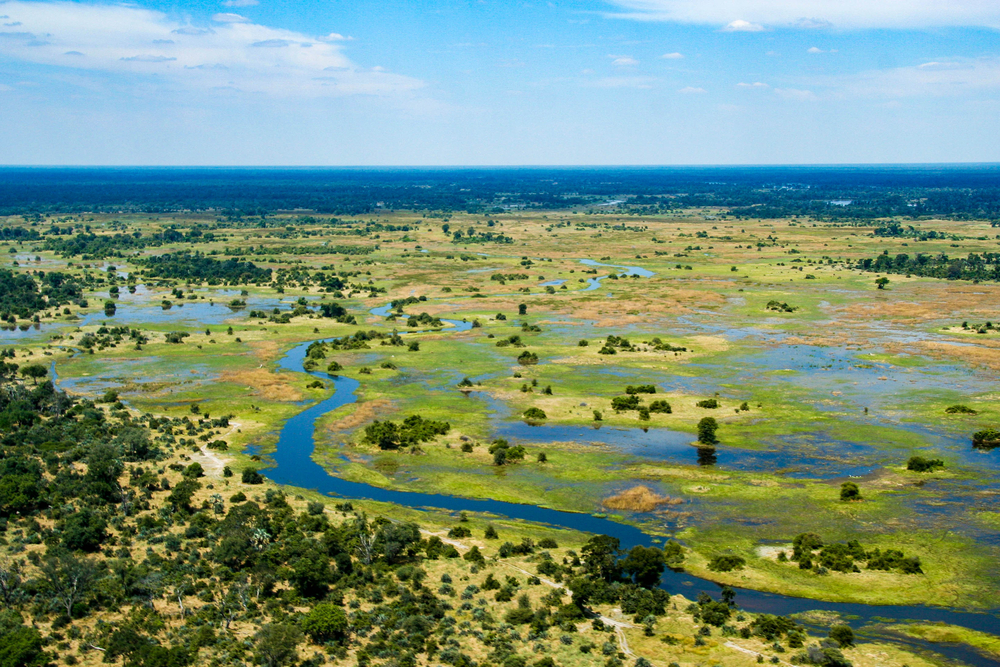In the calm of Botswana‘s Okavango Delta, where the morning sun creates a golden glow on the water’s surface, an amazing metamorphosis is occurring. Women are taking the lead in changing an industry that was formerly thought of as a man’s domain: guiding tourists through beautiful waterways.
The magnificence of the Okavango Delta
Bontle Cindy Mothogaathobogwe, a pioneering woman guide, refers to the Okavango Delta as Africa’s crown gem. She is part of the indigenous Bayei tribe from Maun, grew up in the small village of Boro on the southern fringes of the Okavango Delta, and began steering traditional mokoro canoes when she was a young child.
“To ride a mokoro through these waters is truly special,” she goes on to say. “It’s like being an ambassador of our state, sharing our culture with tourists amidst the tranquility of the Delta.”
Compared to other safari sites such as Kruger National Park, the Okavango Delta has been mostly unaffected by human influence. Its two-million-hectare swath of marshes and grasslands supports a diverse range of animals, including 264 mammal species, 157 reptile species, and 540 bird species, which are protected by the indigenous Bayei tribe of Maun.
The Bayei tribe serves as guardians of the Okavango Delta, preserving its rich biodiversity and safeguarding its status as a UNESCO World Heritage site. Their efforts combat poaching and farming encroachment, ensuring the survival of 264 mammal species, 157 reptile species, 540 bird species, and the iconic population of elephants.
Preserving traditions and empowering women
For centuries, residents have mokoro to navigate the Delta’s complex waters. Today, women like Mothogaathobogwe are rewriting history by leading tourists through this unspoiled environment. “In the olden days, women collected grass for building materials,” she said. “Now, we’re breaking barriers, leading tourists on mokoro expeditions, and reshaping narratives.”
A journey of conservation and inspiration
Mothogaathobogwe’s guiding focuses on more than just traversing the Delta; it also promotes environmental protection and community empowerment. “My community sees me as an inspiration,” she said. “They’re learning from me, and every day, we’re challenging stereotypes and promoting diversity in the industry.”
Women have long struggled with prejudices in the safari sector, believing that guiding requires Herculean strength and long separations from family. These assumptions have kept female involvement low.
However, a new movement in Africa is actively empowering women in this area. An all-female Batswana safari guide team at Botswana’s Chobe Game Lodge is pushing norms. Meanwhile, African Bush Camps launched a Female Guide Program in 2021, which would include extensive driving and animal tracking instruction. Surprisingly, more than 200 candidates competed for just five prized positions. Notably, Asilia Africa’s Dunia Camp in Tanzania’s Serengeti stands out as one of the continent’s first all-female safari camps, with women in positions ranging from chefs to guides, managers, and housekeepers.
Mothogaathobogwe and Beauty, her fellow mokoro poler, are part of a small number of women who thrive in Africa’s safari sector. They challenge convention as Ker and Downey Women Empowerment Scheme grantees by taking in typically male-dominated roles such as mokoro polers and mechanics.
MC Odumetse, group managing director of Chobe Holdings Ltd., explains, “This initiative is part of our broader commitment to challenge stereotypes and promote diversity in the safari industry, reflecting our belief that talent knows no gender boundaries.”
The motivation to move forward
The ripple impact of empowering women in the safari industry goes far beyond individual success stories. It drives good transformation in local communities, resulting in increased economic prosperity and household stability. Furthermore, it broadens educational options for children and boosts community morale.
Reflecting on her impact, Mothogaathobogwe shares, “My community is very impressed; they are highly motivated by me. I would say I am their inspiration, and they are learning from me.”
Mothogaathobogwe exemplifies persistence and tenacity as she handles her mokoro and scans the water’s surface. Her path is more than just a professional choice; it is a monument to women’s unwavering energy, reshaping landscapes and narratives one paddle at a time.












